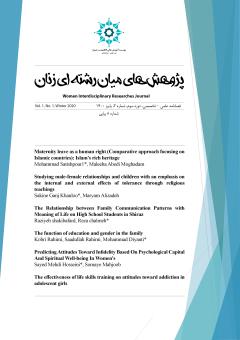The function of education and gender in the family
Subject Areas :kubra rahimi 1 , sadullah rahimi 2 , Mohammad Dianati 3 *
1 - Doctoral student of Women's Studies, Islamic Azad University, Science and Research Unit, Tehran, Iran
2 - PhD student of Persian language and literature, Islamic Azad University, Kerman branch, Kerman, Iran.
3 - Assistant Professor, Department of Persian Language and Literature, Islamic Azad University, Kerman Branch, Kerman, Iran. (corresponding author).
Keywords: education, gender, family.,
Abstract :
A correct and accurate evaluation of an idea is conditional on genealogy, that is, the investigation of that idea's philosophical, social, and historical roots. Paying attention to the production of knowledge and empowerment and adherence to the continuation of the development of values and insights today requires the influence of the family function. The family system is relied on adjusting the identity, improving the human personality, and educating people; these factors are based on a proper education system. A rational response is important in the development of responsibility and ethics-oriented stage in the legislative system, as well as education and documentary, up-to-date scientific research. Surveys show that the equal approach in the gender education field does not accept disappointment, skewed thinking, or skewed taste. Also, documented programs make training and coordination stable to remove the concern of gender perspective in the family and society. Education, whether it challenges or perpetuates inequalities, is a significant principle requiring the drawing up of an efficient order in implementation. The regularity principle, the education coordination stages, training, and coordination between physical and mental training are important points of education unity and family stability. The findings show that coordination in the direction of the flourishing of gender characteristics and benefiting from the gifts of gender differences in the necessary opportunities and contexts is not always equal. The result of the efficiency of the research is the creation of platforms that place the subject of gender education in providing equal opportunities and the possibility of making the right choice based on inherent gender differences.
1- احمدی، و. (1392). تغییر نگرش نسبت به نابرابری جنسیتی در طی فرایند گذار جمعیتی. جامعه¬شناسی کاربردی، 4(3)، 15-34.
2- استفانی، گ. (۱۳۹۶). جامعهشناسی جنسیت. ترجمه بقایی، ک. نشر نی. تهران.
3- بیریا، س. (1400). بررسی دیدگاه اسلام در مورد عملکرد اقتصادی زنان و نقش آنان در توسعه اقتصادی. پژوهشهای میانرشتهای زنان، 1(3)، 75-92.
4- جفرودی، م. (1392). متفکرین اجتماعی معاصر. نشر مرکز. تهران.
5- حسنی، س. م. (1383). تفاوتهای جنسیتی از دیدگاه اسلام و فمینیسم. مطالعات راهبردی زنان، 23، 189-219.
6- خسروی، ز.، رفعتی، م.، و فروزش، س. ن. (1382). مبانی روان¬شناختی جنسیت. دفتر برنامهریزی اجتماعی و مطالعات فرهنگی، وزارت علوم تحقیقات و فناوری. تهران.
7- شریعتمداری، ع. (1371). اصول تعلیم و تربیت. انتشارات دانشگاه تهران. تهران.
8- شریفی، ا. ح. (1389). آئین زندگی، اخلاق کاربردی. دفتر نشر معارف. قم.
9- شیخاوندی، د. (1385). بازتاب هویتهای جنسیتی در کتابهای تعلیمات اجتماعی آموزش ابتدایی و دوره راهنمایی تحصیلی. فصلنامه تعلیم و تربیت، 22(3)، 93-120.
10- صمدی، م. (1384) بررســی باورهای برنامه ریزان درسی درباره دختران و پسران در زمینه شناختی. مطالعات اجتماعی-روان شناختی زنان (مطالعات زنان)، 3(8)، 83-96.
11- ضيمران، م. (1390). میشل فوکو: دانش و قدرت. چاپ ششم. نشر هرمس. تهران.
12- کاردان، ع. م. (1390). سیر آراء تربیتی در غرب. چاپ پنجم. انتشارات سمت. تهران.
13- کانت، ای. (1368). تعلیم و تربیت اندیشهای درباره آموزشوپرورش. ترجمه شکوهی، غ. چاپ دوم. انتشارات دانشگاه تهران. تهران.
14- گروسی، س. (1384 ). برسی تاثیر باور های قالبی بر نابرابری جنسیتی, مورد مطالعه شهر کرمان و روستا های پیرامون آن. پایان نامه دکتری جامعه شناسی، دانشکده علوم اجتماعی دانشگاه شیراز.
15- گیدنز، آ. (1989). تجدد و تشخیص: جامعه و هویت شخصی در عصر مدرنیته. ترجمه موفقیان، ن. نشر نی. تهران.
16- مطهری، م. (1375). تعلیم و تربیت در اسلام. نشر صدرا. تهران.
17- معینیان، ن. (1396). نگاهی جامعه شناختی به نقش تصورات قالبی جنسیتی در تبعیض شغلی علیه زنان ث عوامل زمینه ای موثر بر شکل گیری این تصورات قالبی دره فرهنگ ایران. زن و مطالعات خانواده، 10(37)، 163-179.
18- Benavot, A. ( 1989). Curri cula school officials and time in stroctionl in tended of stuudy global. IBE UNESCO: Gneva.
19- Arnot, M., & Dillabough, J. A. (1999). Feminist politics and democratic values in education. Curriculum Inquiry, 29(2), 159-189.
20- Bliss, S. A. (2009). The effectiveness of gender specific education on academics and behavior among public middle school students (Doctoral dissertation).
21- Chaplin, T. M., Cole, P. M., & Zahn-Waxler, C. (2005). Parental socialization of emotion expression: gender differences and relations to child adjustment. Emotion, 5(1), 80.
22- Frazier, N., & Sadker, M. (1973). Sexism in school and society. HarperCollins Publishers.
23- Rolfe, H. (1999). Gender Equality and the Careers Service EOC.
24- Stanley, G.(2013). Language Learning with Technology–Ideas for Integrating Technology in the Classroom. Cambridge: Cambridge University Press. Ilha do Desterro: A Journal of English Language, Literatures in English and Cultural Studies, (66), 301-307.
25- Stone, A. (2006). Luce Irigaray and the philosophy of sexual difference. Cambridge University Press.
26- Zimmer, L. (1988). Tokenism and women in the workplace: The limits of gender-neutral theory. Social problems, 35(1), 64-77.

